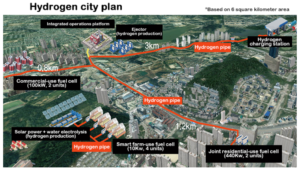South Korea Launches Hydrogen Cities Initiative
By Stephen H. Crolius on May 14, 2020
In October 2019 South Korea’s Ministry of Land, Infrastructure, Transport, and Tourism (MLITT) announced a “hydrogen-powered cities” initiative that the World Economic Forum characterized as a bid to “win the race to create the first hydrogen-powered society.”

In late December, the news site FuelCellsWorks reported that MLITT had revealed the identities of four “candidate cities” that are being considered for the program, Ansan, Ulsan, Wanju, and Jeonju. A fifth city, Samcheok, was designated as an R&D hub for hydrogen technology. Each of the three cities ultimately chosen for the program will receive KRW 29 billion (USD $24 million) in funding to support a range of projects that includes green hydrogen production schemes, fueling infrastructure for fuel cell vehicles, and combined heat and power systems for the built environment. Project assets are expected to be in place by 2022.
A Korea Herald report at the time of the October announcement put the initiative into a broader context:
The hydrogen city project is in line with the government’s broader hydrogen road map announced in January …
The government plans to transform 10 percent of the country’s cities, counties and towns into hydrogen-powered ones by 2030 and 30 percent of them into hydrogen ones by 2040 “to gain a sizable share in the world’s growing hydrogen markets,” it said.
Korea Herald, S. Korea to build 3 hydrogen-powered cities by 2022, October 10, 2019
Numerous Ammonia Energy articles have discussed the potential for countries to realize their vision for a hydrogen economy by importing low-carbon energy using ammonia as a hydrogen carrier. South Korea, like Japan, relies heavily on energy imports to fuel its economy, and is working hard to identify supply chains to fuel these hydrogen cities.